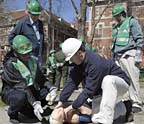Industry News

Cities Focus on Homeland Defense Spending
Fifty U.S. cities have been identified to receive, via their respective states, a total of $2.9 billion in federal funding for homeland defense through the Department of Homeland Security’s Urban Area Security Initiative (UASI). Cities will receive anywhere between $6.2 million to almost $50 million for security equipment and training.
With many major metropolitan areas strapped for cash in the current economic climate, the federal grants could be a windfall to municipalities that spend it wisely. Security concerns that cities hope to address are broad.

New York was awarded the largest UASI grant, with Chicago, Washington, D.C., Los Angeles, San Francisco, Philadelphia, Houston and Boston all receiving $19 million or more. Visit www.dhs.gov.

Spatial Tracking Could Be in Security's Future
Behavioral scientists are beginning to have some success in using spatial tracking technology to discern patterns in primate behavior. With enough studies completed to pick out correlations, distances between individuals and rates of movement can be applied to predicting mood and mode.Emory University’s Kim Wallen, Ph.D., a Dobbs Professor of Psychology and Behavioral Neuroendocrinology and head of CBN Reproduction Collaboratory, and his graduate student Rebecca Herman, have been working with Georgia Institute of Technology computer scientists Tucker Balch, Ph.D., and Zia Khan to adapt a visual tracking system Balch and Khan originally developed for analyzing the social behavior of ants and bees to study spatial cognition in rhesus monkeys. The technology applies complex computer algorithms to digital video recordings to create three-dimensional spatial paths.
While Balch hopes to eventually use computer models of behavior to build and program robots, current research suggests that spatial tracking could be used to chart retail shoppers’ buying patterns and develop automatic security systems capable of identifying and alerting to various degrees of suspicious behavior.

Seminar Brings Together Security Pros and Tomorrow's Brass
Approximately 160 business, government, media and academic leaders from across the country took part in a five-day seminar on national security sponsored by the U.S. Army War College, Carlisle, Pa.
The colloquium enabled students to witness a civilian viewpoint on defense matters while also giving participants the chance to meet and exchange views with future high-level officers of the Army, Navy, Air Force, Marine Corps and Coast Guard. "That provides us an opportunity to bring civilians from all walks of life to the college to meet, confer, debate and participate in group discussions with our students," said Army Lt. Col. Merideth Bucher. "It opens the door to a wider dialogue, which benefits both the students and the greater community." Visit www.carlisle.army.mil.

Los Angeles Medical Center
Security magazine honors facility, security and life safety executives at Kaiser Permanente, one of America’s leading healthcare systems.One example: it will boast significant high tech protection at its new Los Angeles Medical Center (LAMC) with advanced fire detection, voice evacuation and smoke purge systems. The technology is from Siemens Building Technologies, Inc., of Buffalo Grove, Ill.
To help protect the LAMC, the facility will have a FireFinder system with integrated digital emergency voice evacuation. The advanced technology enables the system to respond to a fire instantaneously, automatically activating alarms and engaging all necessary emergency control operations within three seconds of a detected fire. The system’s emergency operations capabilities include sprinkler monitoring, fire door closure, elevator capture and interface to the building automation system. Digital voice evacuation capabilities provide for clear distinguishable messages to all sections of the building. The system features an extra-large display screen at the central fire panel to provide critical information to fire fighters
Looking for a reprint of this article?
From high-res PDFs to custom plaques, order your copy today!



